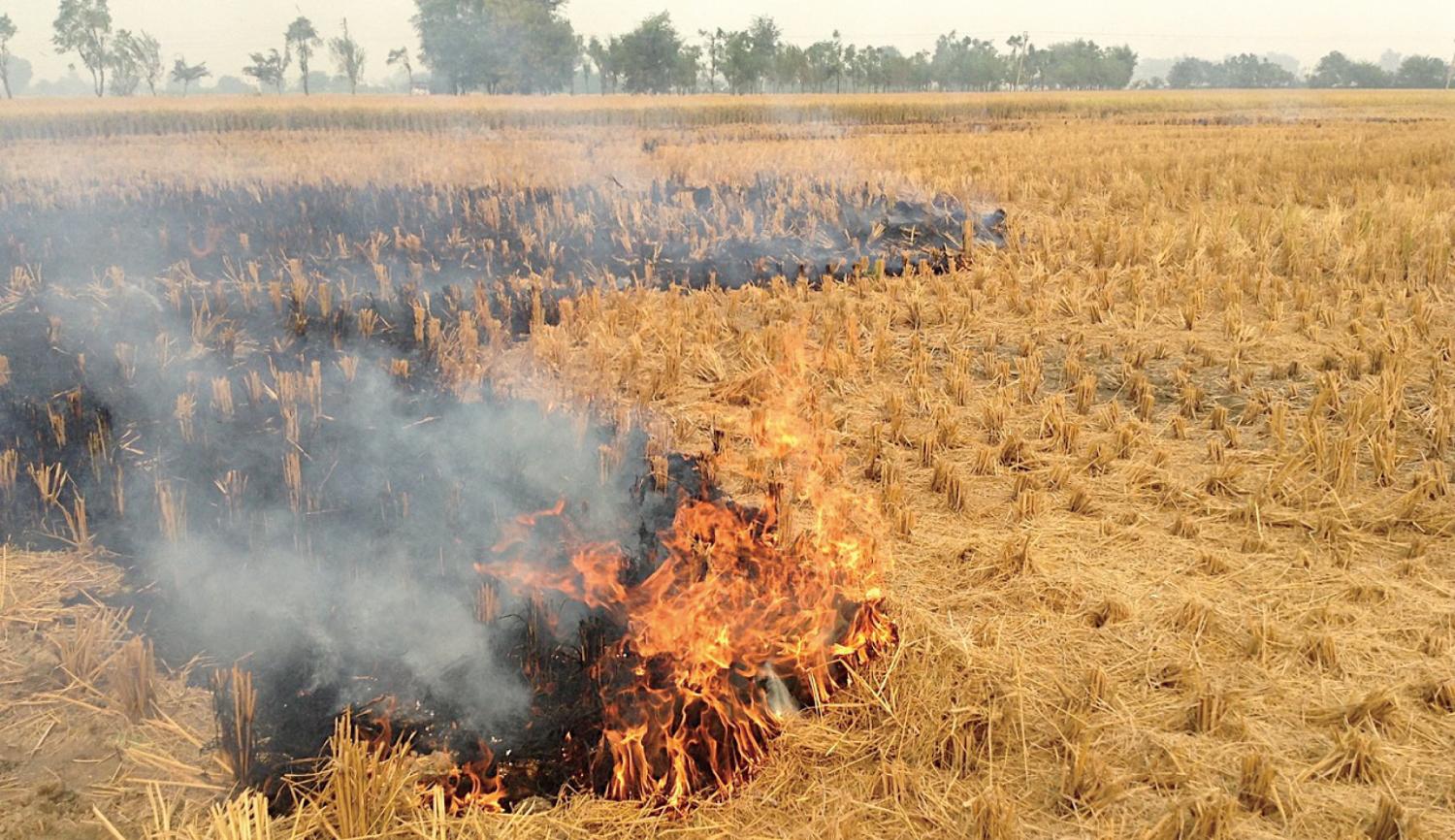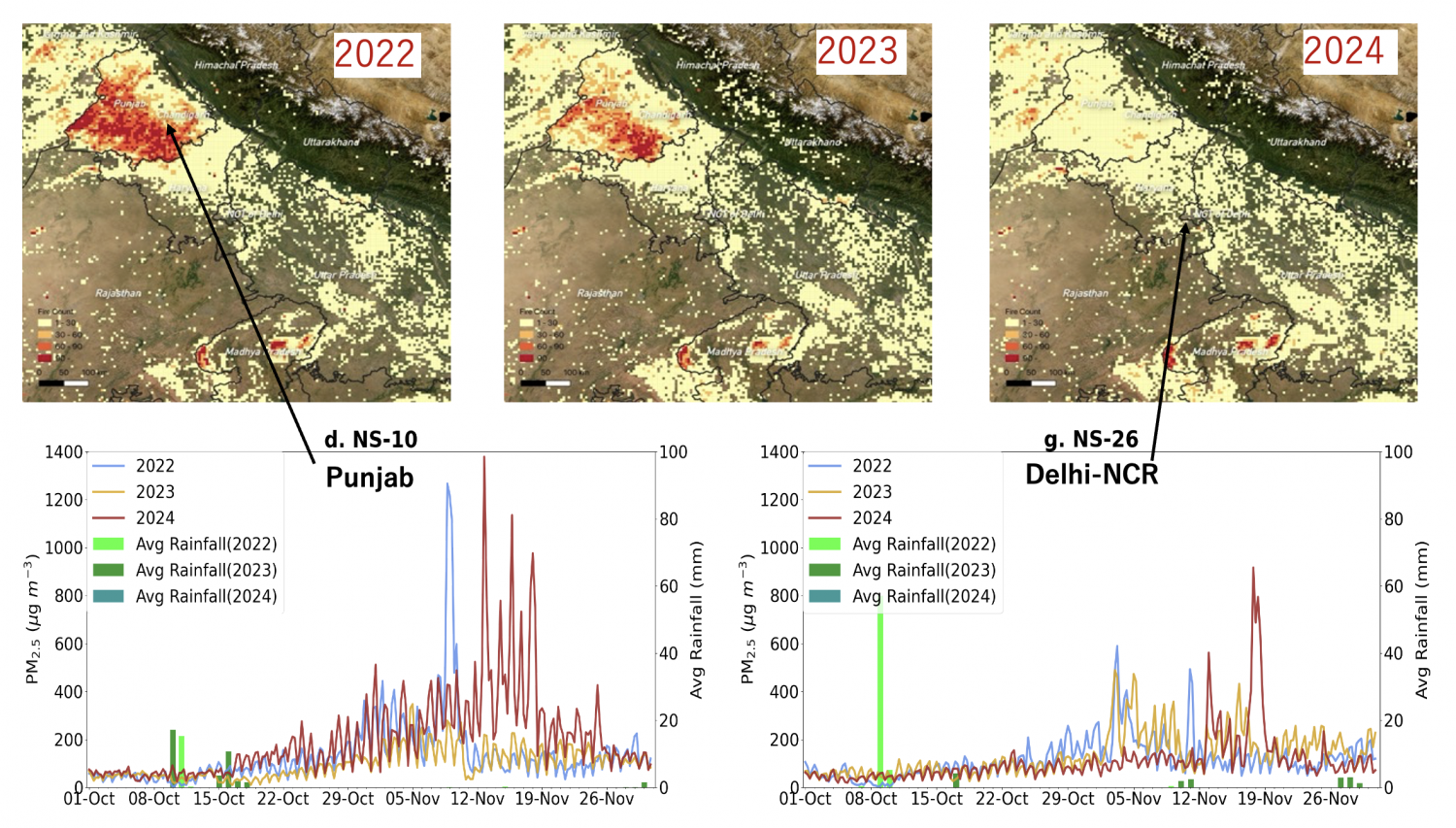
Fisical Year Completed
2024
Aakash Project
- Related links
An Interdisciplinary Study Toward Clean Air, Public Health and Sustainable Agriculture: The Case of Crop Residue Burning in North India
Abstract
A large amount of rice straw is burned after the kharif crop season in the northwest India region. This practice of crop residue burning releases large amounts of pollutants into the atmosphere, causing severe conditions for human health and economic activities. The Aakash project is delineating the science of air pollution in the region (including the national capital of Delhi), raising social awareness, and exploring ways for sustainable agriculture.
What have we learned and to what extent?
We have explained the linkages between emissions from rice crop residue burning in Punjab and Haryana, two of the northwestern states of India, on particulate (PM2.5) air pollution in Delhi national capital region (NCR). Contrary to original hypothesis, we are surprised to find PM2.5 exceeding 300 microgram per cubic-meter (mg m-3) in Punjab, lasting over weeks in November (Fig. 1). Our project also estimated the cost of high PM2.5 on human health and economic burden using commonly available methodology. Based on the field surveys and field experiments socio-economic models have been developed to assess farmers’ limitations for noncompliance to zero crop residue burning policy of the governments. Surveys found that marginal farmers are resorting to land clearing through burning than the farmers with larger land-holding, as marginal farmers choose to grow more resilient rice cultivars (greater straw biomass) and receive lower priority in access to the modern machinery. We have put forward tangible solutions for crop diversification, rice straw management and air pollution monitoring in sustainable way. The timing of our project coincided with the national drive to improve air quality and thus the outcomes of the project are of relevance with immediate applications. New observations of high PM2.5 have been helpful to convince citizens and policymakers alike to act for clean air.
 Figure 1: Satellite fire detection count (FDC) on the ground show decrease during 2022-2024 (top row; left to right), but the measurements of PM2.5 using CUPI-G sensors show increasing trends in Punjab and Delhi-NCR (bottom row; colored lines).
Figure 1: Satellite fire detection count (FDC) on the ground show decrease during 2022-2024 (top row; left to right), but the measurements of PM2.5 using CUPI-G sensors show increasing trends in Punjab and Delhi-NCR (bottom row; colored lines).
Our concept of global environmental studies
Global environmental problems are a plenty and most of those are enhanced by the pressure of human activity on planet Earth. In northwestern India, we focused on crop residue burning in Punjab and Haryana as a cause of air pollution in Delhi-NCR. It is well known that burning of dry matter release a lot of particulate and gaseous air pollutants to the atmosphere that are transported far distances inside and across national boundaries. The crop residue burning in the region is caused by a shear pressure of crop intensity increase in the past few decades to feed hundreds of millions of populations. Thus, a small regional or a local scale human activity can cause global problem if grown unsustainably and left uncontrolled knowingly. We are in a fast-changing world and new environmental problems appears more frequently than ever before. Improved surveillance, prompt action and long-term monitoring will be required for minimizing the cost on the society.
New connections
Our project members are striving to make new connections, be it for (1) wider and denser coverage of air pollution measurements to support the Air Quality Early Warning System (AQ-EWS), (2) development of infrastructure to manage crop residue for the benefit of farmers through industrial use, or (3) establish supply chain to process and market products from crop diversification. New projects have been developed for better understanding the satellite-derived fire emissions, PM2.5 measurement (currently out of phase with FDC, as suggested by Fig. 1), and to aid the AQ-EWS. Networking between Japanese and Indian researchers is going strong on crop diversification and application of biochar in joint carbon-credit mechanism. Indian researchers are also showing strong interests on precise assessment of health and economic burdens of air pollution.
News
-
{{ data.disp_date }}
{{ data.content }}
Project Leader
HAYASHIDA Sachiko(FS-FR3)、PATRA, Prabir K.(FR4-FR5)
Evaluation by an external evaluation committee
Research schedule
| 2018 | 2019 | 2020 | 2021 | 2022 | 2023 | 2024 |
|---|---|---|---|---|---|---|
| FS | FS/PR | FR1 | FR2 | FR3 | FR4 | FR5 |